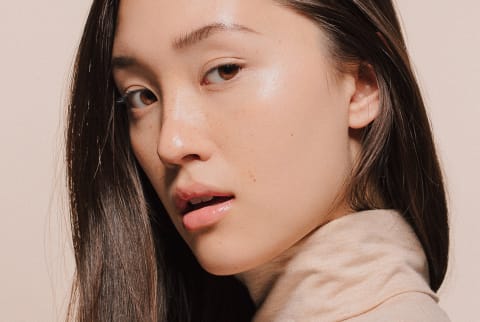Lacking This Nutrient Can Lead To Blackheads + Congested Skin, Studies Show


There's no denying that the skin and gut are connected. What you consume can directly affect how your skin looks—whether it's plump and bouncy or dull and inflamed. Eating for your skin health is nothing new, and all it takes is consuming generally good-for-you foods, like antioxidant-rich fruits and veggies, healthy fats, and the like.
However, studies have shown that lacking certain foods—specifically, certain food groups—can have a negative impact on skin health and even manifest into acne. Here's what you should know.
Advertisement
How protein impacts your skin.
More often than not, experts advise against a high-glycemic index in the name of skin health, and for good reason: "High glycemic index and increased daily glycemic load intake were positively associated with acnegenesis and acne severity," researchers found1.
However, that may account for only part of the problem. As this 2019 study demonstrates2, protein could play just as important of a role. "A high glycemic index and low protein diet can lead to hyperinsulinemia and a cascade of endocrine triggers, like raised insulin-like growth factor-1(IGF-1) and androgens, resulting in acne," the researchers explain. In fact, they found half of their participants with acne also were deficient in protein (aka, less than 30 grams per day).
They also note a striking correlation between low protein intakes and pigment disorders like melasma and post-inflammatory hyperpigmentation. "Poor amino acid supply limits the capacity of skin to repair the photodamage and decreases the keratinocyte turnover rate along with the accumulation of melanin," they explain.
All of this to say: Consuming less than 30 grams of protein a day is not ideal for the skin—or the rest of your body, for that matter. In fact, a growing chorus of health and nutrition experts are encouraging people to go beyond the RDA3 (which is set at 0.8 gram of protein per kilogram of body weight per day).
In fact, some even recommend increasing protein intake to closer to 1.2 to 1.6 grams per kilogram of body weight (roughly 110 to 120 grams a day)—especially in older age since our ability to efficiently convert protein into muscle declines after we turn 604 or so.
There are plenty of protein sources out there, both plant- and animal-based. Here's a quick list of some high-protein options to consider adding to your diet:
- Grass-fed collagen peptides: 15 grams of protein
- Cottage cheese: 13 grams of protein
- Seafood: 28 to 40 grams of protein
- Turkey breast: 25 grams of protein
- Black beans: 15 grams of protein
- Lentils: 18 grams of protein
Advertisement
There are so many more quality sources out there (a few to note here). However, for all-around skin benefits, grass-fed collagen stands out among the rest. Especially if you can find a product with even more skin-loving ingredients, it's worth adding to your routine for the protein and beauty boost. Here's a curated list of our top picks to shop, all backed by a nutrition Ph.D.
The takeaway.
What you consume will directly impact your skin, so make sure you're getting enough protein and limiting high glycemic index foods when you can. It's not always easy to get enough protein throughout the day, but it is certainly possible with a bit of intention and planning. Want to learn more about the recent raise in recommended protein intake? Here's everything you need to know.
Advertisement

Hannah Frye is the Assistant Beauty Editor at mindbodygreen. She has a B.S. in journalism and a minor in women’s, gender, and queer studies from California Polytechnic State University, San Luis Obispo. Hannah has written across lifestyle sections including health, wellness, sustainability, personal development, and more. She previously interned for Almost 30, a top-rated health and wellness podcast. In her current role, Hannah reports on the latest beauty trends, holistic skincare approaches, must-have makeup products, and inclusivity in the beauty industry. She currently lives in New York City.